|
On Saturday 9 September the Central Division of Somerset Beekeepers held an information pitch at Wells Market in Somerset. The idea behind this was to get the message to the public and ask for their help in locating and reporting Asian hornets (AH) by using the AH Watch app. This Saturday was also chosen to coincide with AH week.
Over the course of the day we spoke to over 500 people, many of whom had heard about the AH issue but very few knew what they could do to help...until now. With most of the mainland UK sightings having been made by members of the public I felt, as Chair of Central Division, that it was no good me sitting on my backside moaning about the apparent lack of information that is getting through to the public but better to get out there and do something about it...so did. At the time of booking and organising this event there hadn't been coverage on the BBC, this also helped peoples awareness on the day. The Non Native Species Secretariat provided me with a number of exceedingly good quality handouts and we also used some that were printed by Somerset BKA last year. The public, once they realised we weren't looking for sponsorship or anything were mostly accepting and some had heard of the issue and promised to download the app. Many also had pictures on their 'phones of European hornets which are abundant this year. In the 60s every Post office in the UK had posters up about Colorado Beetles...why haven't they now got posters about AH, with information about the app. We need as many eyes on the ground as possible and a national campaign needs to be up and running or we will be too late and in a few years time beekeepers, those who still have hives, may well be trying to find ways to live with the AH. Nick Potts, Chair Central Somerset Beekeepers Lynne Ingram MB, Somerset's AHAT coordinator, joint events officer and Zoom pilot is lecturing at the BBKA's online Spring Convention.
Her talk, Know your enemy: Facing the Asian Hornet threat, takes place at 11.45 am on Sunday, April 18. Afterwards she will join Dr Pete Kennedy from Exeter University, who is speaking in the slot before on Asian hornets: A brief overview and new insights, and answer questions live. Lynne has been keeping bees for over 30 years, and currently manages 20 colonies in three apiaries. She has been involved in tracking hornets in Jersey and was a contributor to ‘The Asian Hornet Handbook’ by Sarah Bunker. For tickets and more information about the event, which runs from April 15-18, visit the website.  In spring, as temperatures rise, Asian hornet queens (Vespa velutina nigrithorax) emerge from hibernation. Monitoring now may identify any queens which have overwintered in the UK. Lynne Ingram, MB and Somerset BKA’s AHAT coordinator, recommends the use of monitoring stations rather than killing traps. She says: “This allows us to get the evidence of Asian hornets that we need, without killing our native beneficial insects, in particular European hornets.” At this time of year Asian hornet queens will be searching for sugary foods to build up their energy rather than preying on honey bees. So, all monitoring stations should be positioned where you can easily see them and check them daily - eg outside the kitchen window, or in a sunny spot in your garden. All beneficial insects should be released from monitoring stations daily. From mid-May Asian hornet queens will be mainly in their nests and so monitoring stations can be removed. We suggest the adaptation of Thorne’s traps to include wick stations inside to allow wasps and small flies to escape. Liquid bait - get Suterra (now sold as Trappit wasp attractant) from your AHAT Team leader or buy online. If you can't get it due to current restrictions try one of these French recipes:
If you think you have seen an Asian Hornet:
Jersey is using a modification to the origin design to allow beneficial insects to escape. The wick pot prevents all but the smallest insects from entering from the side. They still require daily monitoring. The trap:
Cut the sample pot to half its height ie 3.5cm and fit the lower section through the top section base first. Place a small block of wood or similar over the top of the pot and tap the two parts together. That way you retain the screw top and the modified pot fits snuggly into the trap. Drill a 12mm hole in the lid to take the wick which is made from paper towelling/Jeyes cloth etc. Fill with your liquid bait. The wick pot prevents all but the smallest insects from getting down the side, and the liquid bait doesn’t evaporate so quickly. The holes in the trap allow beneficial insects to escape. Please monitor regularly. For more information check out our Asian hornet page. And here for resources. David Charles was one of Somerset BKA's most illustrious members and he will be sorely missed by his many friends in the beekeeping community here and across the UK. His list of achievements is long and distinguished and included serving as President of the BBKA. His beekeeping friendships over the last 60 plus years spanned a who's who of latter day beekeeping giants including LE Snelgrove and Rex Sawyer. He was a passionate beekeeper, communicator and teacher; he launched BBKA News and edited it for several years and wrote for BeeCraft magazine. He twice served as President of Somerset BKA, was a Vice President, a member of Somerton Division and wrote an excellent history of Somerset beekeeping (Somerset Beekeepers and Beekeeping Associations: A History, 1875-2005). He was instrumental in the formation of South West Beekeepers’ Forum (which provides a forum for consultation on matters of concern and interest to beekeepers from across the region). He served two terms as chairman and was one of Somerset’s delegates until very recently. Beekeeping accolades included being awarded the 1972 Wax Chandlers’ prize as the best national candidate in the BBKA exams; he was a Master Beekeeper and BBKA Honorary Member. Throughout his beekeeping career he was a keen supporter of the National Honey Show being, variously, a competitor, committee member, honey judge and, more recently, a supporter and visitor. He was a teacher and on retirement became the county's beekeeper adviser at Cannington. In 2019 David gave up active beekeeping and his final public appearance was in late 2020 when he talked to Anne Pike, former SBKA chairman, in a BeeCraft Cameo video reminiscing about how he started beekeeping. David was very good company, a hugely knowledgeable mentor and a lively contributor on Facebook. David’ funeral was held in St John's Church, Glastonbury on January 15, 2021. Asian hornet awareness week is an excellent reminder to look out for the non native and highly destructive hornets when in the garden and out and about: check flowers, ivy, in wasp traps and fallen fruits.
At this time of year Asian Hornet nests are growing bigger and there are many hungry mouths to feed. This means that if we have any Asian Hornets in the UK, they will be out and about collecting food, and are more visible. They can be spotted feeding on flowers, on the ivy once it is out, and also on fallen fruit. They can also be spotted near beehives, where they will try and catch honey bees as they return to the hive full of nectar. Asian Hornets look like a big wasp, but are mainly black with orangey yellow faces, and a broad orangey yellow band across the base of the abdomen. The bottom part of the legs is yellow. If you spot what you think is an Asian Hornet please Take A Photo, then report it through the FREE AsianHornetWatch app. If it is an Asian Hornet then someone will come to check it out for you. If you are not sure what it is, Take A Photo anyway. You can compare the photos on the app with what you have seen. If you need help with this contact your local Asian Hornet Team https://www.bbka.org.uk/asian-hornet-action-team-map. For Somerset contact [email protected] South West Asian hornet action teams are launching an Asian Hornet Spring Watch publicity campaign over Easter. They are calling on the public to get involved.
Somerset’s AHAT coordinator Lynne Ingram said: “Lockdown means that people will be spending more time in their gardens and on walks around their neighbourhood this Easter. “We would like people to look for Asian hornets on flowers such as camellias, trees that ooze sap and in sheltered spots like sheds and porches while keeping within government guidelines in relation to Covid-19.” Asian hornets have distinctive orange faces and yellow tipped legs and are smaller than the bright yellow striped European hornet. “If anyone sees an insect they think is an Asian hornet, check it out on the Asian Hornet Watch app which has an identification guide and lets you send in your sightings.” Beekeepers and conservationists hope to mobilise support from all over the region to prevent the destructive insects getting established in the UK where they will decimate populations of pollinating insects and honeybees. “Given the many pressures on our precious pollinators, including climate change, habitat destruction and pesticide use, it’s vital we do all we can to support them by reporting sightings.” Somerset Beekeepers’ Association has many useful ID materials on its website including a children’s colouring-in sheet. https://www.somersetbeekeepers.org.uk/resources.html Asian hornets are a notifiable invasive species and should be reported immediately, preferably with a photo using:
Ends Notes to editors: Asian hornets (Vespa velutina nigrithorax) are slightly smaller than native European hornets and look like large black wasps with an orange face and yellow legs:
A single Asian hornet can kill 50 bees a day, with a nest containing up to 6,000 workers and up to 350 queens. In Jersey, France and large areas of Western Europe they are stripping the environment bare of insects before moving on to prey on managed honeybee colonies. Asian hornets are a notifiable invasive species and should be reported immediately with photo using:
Somerset BKA's Asian hornet action team co-ordinator Lynne Ingram is urging us all to start monitoring for Asian hornets:
"We're approaching the time when Asian hornet queens will be emerging from hibernation – when the temperature is consistently reaching 13 deg C – and so we need to be monitoring for their presence. We don’t know if there are any Asian hornet queens over-wintering in the UK this year, or whether any mated queens will make their way into the UK post-hibernation. But we need to be prepared. Monitoring traps We strongly recommend the use of monitoring stations, rather than killing traps. This allows us to get the evidence of Asian hornets that we need, without killing our native beneficial insects, in particular European hornets. Asian hornet queens will be searching for sugary foods to build up their energy, not preying on your bees. This means that all monitoring stations need to be positioned where you cannot help but see them and where you can easily check them daily - e.g. outside the kitchen window, or in a sunny spot in your garden. All beneficial insects must be released from monitoring stations daily. From mid-May Asian hornet queens will be mainly in their nests and so monitoring stations can be removed. We are recommending the adaptation of Thorne's traps to include the wick stations inside. This allows wasps and small flies to escape. (See photos above). Liquid bait Use Suterra (now sold as Trappit wasp attractant). Get this from your AHAT Team leader if restrictions allow (keep yourself and others safe and comply with government guidelines) or buy online (Pestfix.co.uk sells smaller bottles). If you cannot get it due to current restrictions try one of these French recipes: • Dark beer mixed with 25ml strawberry dessert sauce and 25ml orange liqueur • 350ml sweet white wine (or white wine sweetened with sugar) + 20-30ml mint syrup Please also observe any flowers where Asian hornet queens may be feeding. Any trees that may be oozing sap are also very attractive to queens in Spring. Being confined to our homes at the moment gives us the ideal opportunity to spend time monitoring for Asian hornets. Summer From the August onwards, Asian hornet workers may be found preying on your bees, so monitoring stations may also be hung in your apiaries. Again, we need to be monitoring regularly so that we protect our beneficial insects, and so that we have live samples that could be tracked if necessary. Please register your monitoring stations in apiaries on BeeBase. What to use • Monitoring stations as above • Open bait stations – plastic tray with screwed up kitchen roll, a stone and your liquid bait. Ideally protect these from rain - on a bird table Autumn In the Autumn Asian hornet workers can be observed on fallen and growing fruit and on ivy plants, where they will often be seen taking prey. Males and new queens will be produced in the late Autumn and males can be seen feeding on flowers. This is a crucial time to spot Asian Hornets as it is important to find any nests before the queens emerge and go into hibernation. Observe plants, fruit and also around your apiary. If you think you have seen an Asian Hornet: • Get a photo (or sample) • If you are not sure or are struggling to get evidence contact your local Asian Hornet Action Team – [email protected] • If you are sure and you have evidence, then report on the Asian Hornet Watch App or on [email protected] – and to your local AHAT. Due to current restrictions please make sure that you keep yourself safe and comply with government guidelines. Check BBKA website for updates on how this relates to beekeepers." At the start of Asian hornet week (Sept 9-15) Somerset Beekeepers Association has published a suite of Asian hornet resources we've produced and are happy to share.
Meanwhile our Asian hornet actions teams are busy following up on reports from local people. For example, in the Minehead and Exmoor area there have been several unconfirmed sightings which the local AHAT is investigating. Our Asian hornet roadshow rolls into Taunton's Farmers Market on Thursday & Somerset County Show on September 21-22. The NBU found and destroyed an Asian hornet nest in Tamworth, Staffordshire last week. In Jersey they have caught 69 queens and discovered 54 nests so far this year. While here in Somerset we haven't had a confirmed sighting yet but fear it is just a question of time. If you spot an Asian hornet, perhaps feeding on flowering ivy, take a photo and report through the Asian Hornet Watch app or [email protected]. If you need some help, contact us direct [email protected] Anne Rowberry, Somerset AHAT member and BBKA Vice Chair writes:
"An Asian hornet sighting was confirmed in the Tamworth area of Staffordshire on September 2, 2019. This is the first report since July, when a single hornet was confirmed in New Milton, Hampshire. In each case they were spotted and reported by a member of the public. Since 2016, there have been a total of 15 confirmed sightings of the Asian hornet in England and six nests have been destroyed. Nine of these sightings occurred in 2018; an individual hornet in Lancashire (April) and Hull, three in Cornwall, two in Hampshire, one in Surrey (all September) and one in Kent (October). The risk of an active Asian hornet nest being found in the UK is negligible during the colder winter months, but higher during the summer. Asian hornets have already been spotted this year in countries close to the UK (France and Jersey) and a risk remains at all times of year of accidentally transporting an Asian hornet when returning to the UK from abroad. It is crucial you report any possible sightings so our experts can take quick and effective action to eradicate Asian hornets." Asian hornets are a notifiable invasive species and should be reported immediately, preferably with a photo: Asian Hornet Watch app for iPhone Asian Hornet Watch app for Android or [email protected] the online recording form http://www.brc.ac.uk/risc/alert.php?species=asian_hornet [email protected] In this month's SBKA newsletter, AHAT co-ordinator Lynne Ingram says public enquiries are coming in.
"The AHATs have been busy fielding calls or emails from members of the public who believe they have spotted an Asian Hornet. Most have been European hornets or hornet mimic hoverflies. The Exmoor team headed out to check out a possible sighting but after a day in the area did not find anything. The photo in that case seemed to show a melanistic European Hornet with the yellow headband visible. These almost all black European hornets have added to identification confusion, but they are distinguished from Asian Hornets by a having brown legs and a yellow ‘headband’." Asian hornets (Vespa velutina nigrithorax) are slightly smaller than native European hornets and look like large black wasps with an orange face and yellow legs:
If you see an Asian hornet, take a photo and report it on the Asian Hornet Watch app or contact [email protected] for further advice. |
Archives
March 2024
Categories
All
|
Somerset Beekeepers Association Charity © 2021 Registered CIO Charity 1206483
Affiliated to the British Beekeepers Association
Click here to view our Privacy Policy
Affiliated to the British Beekeepers Association
Click here to view our Privacy Policy
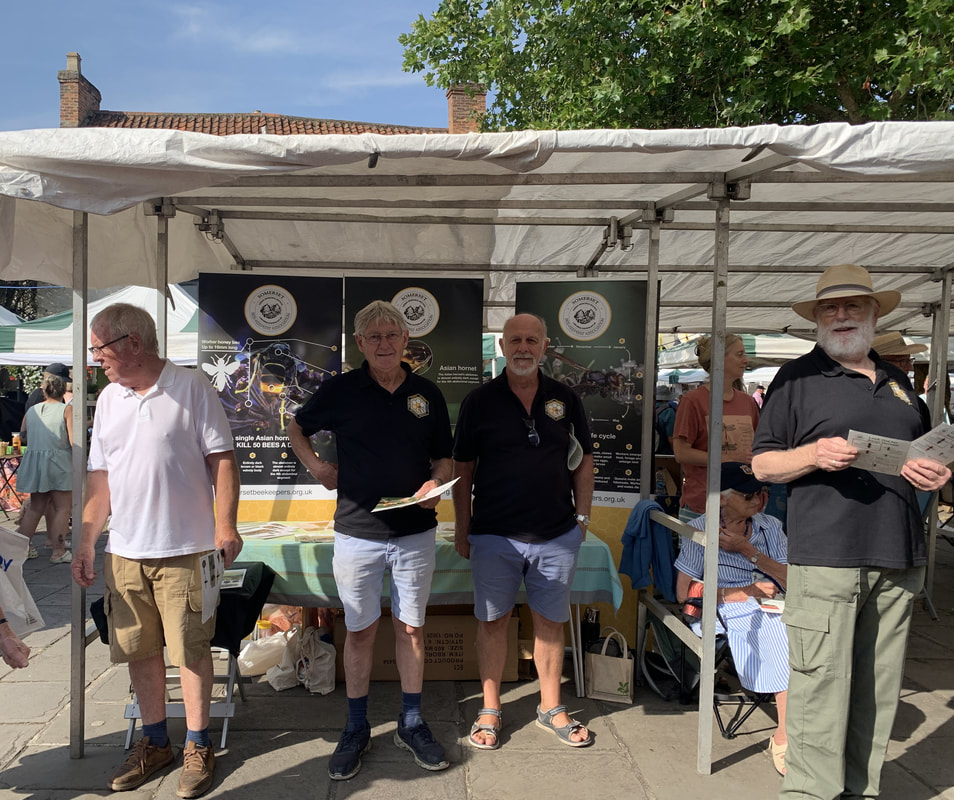
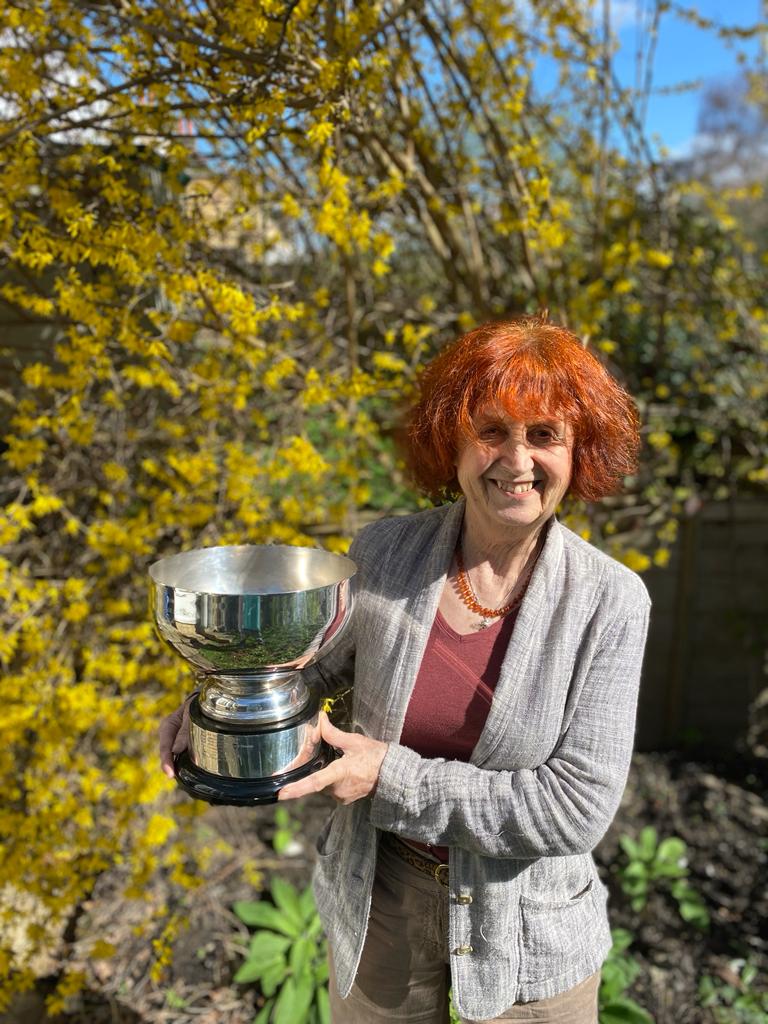
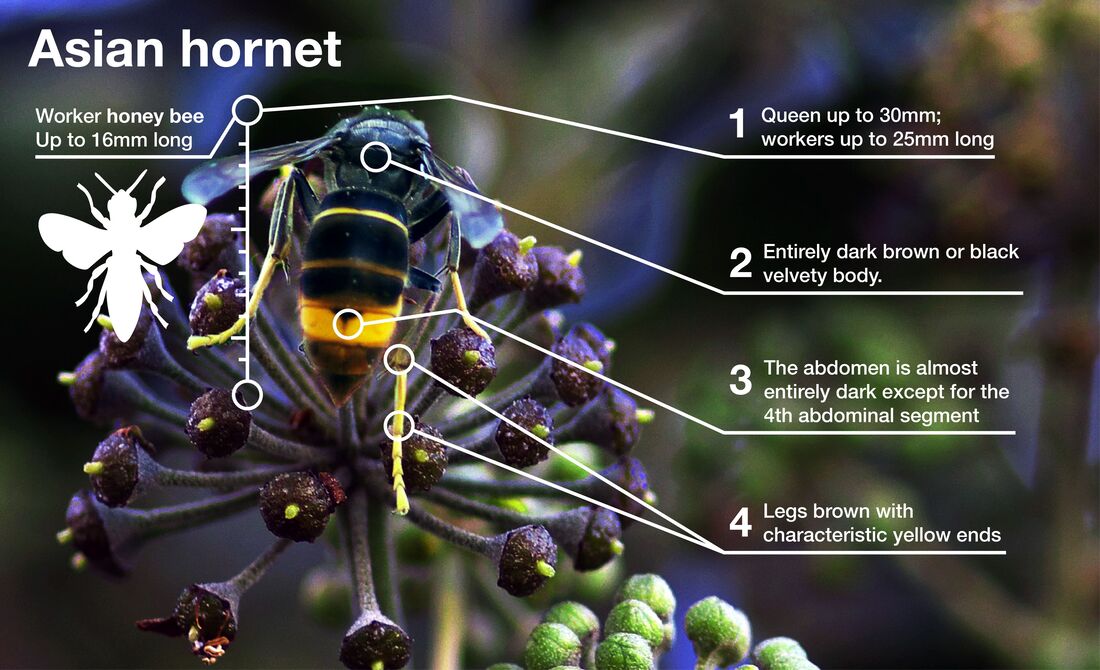
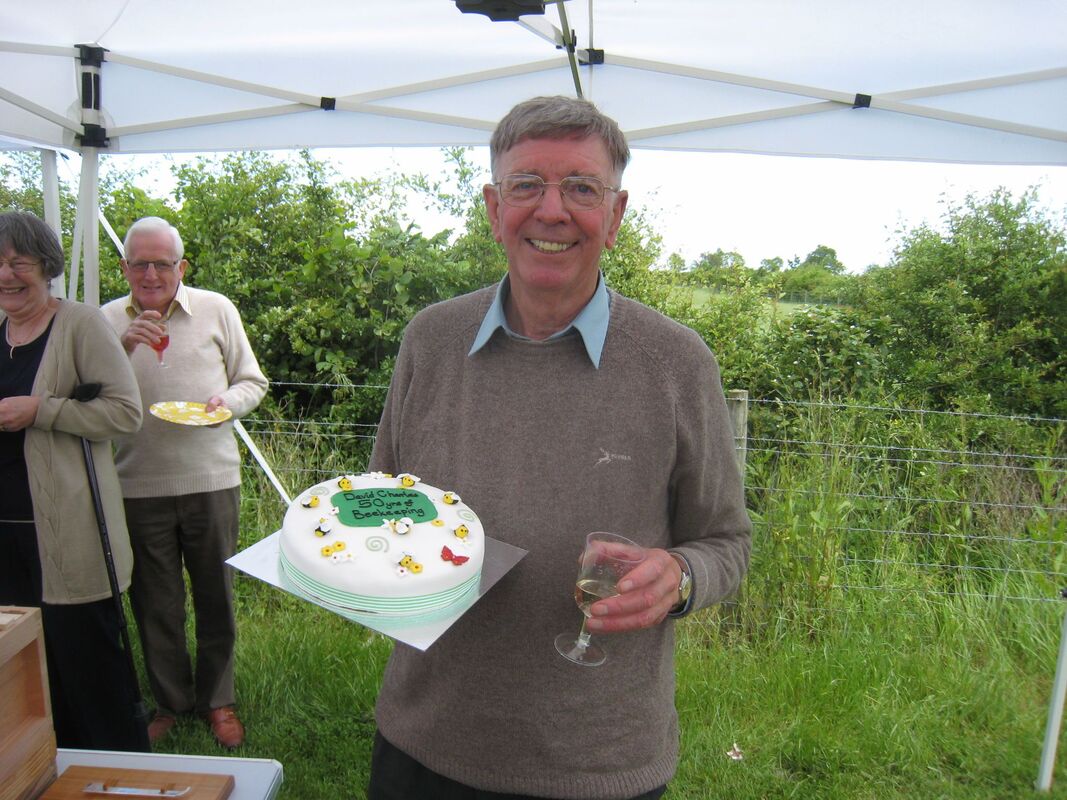
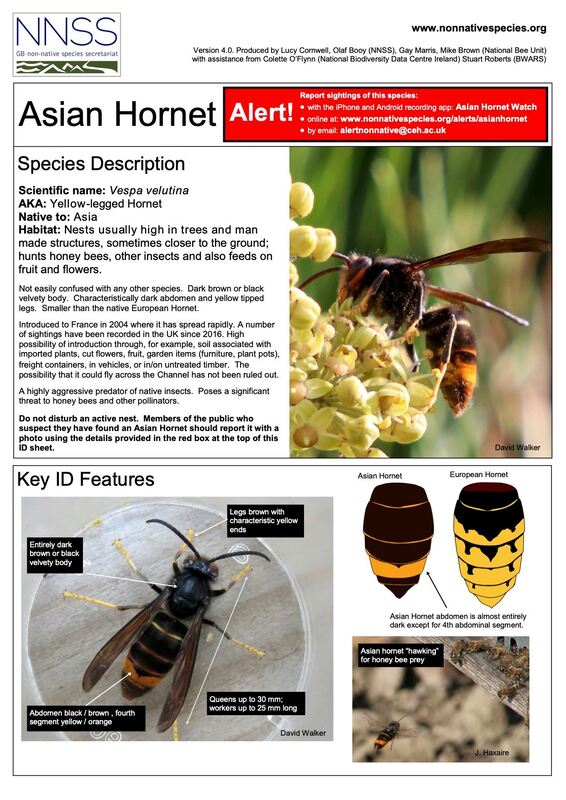
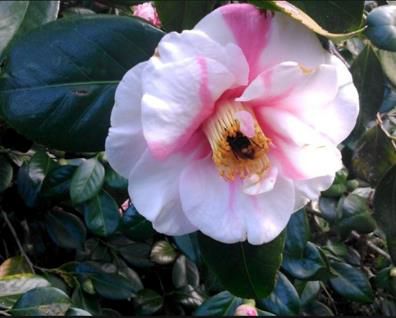

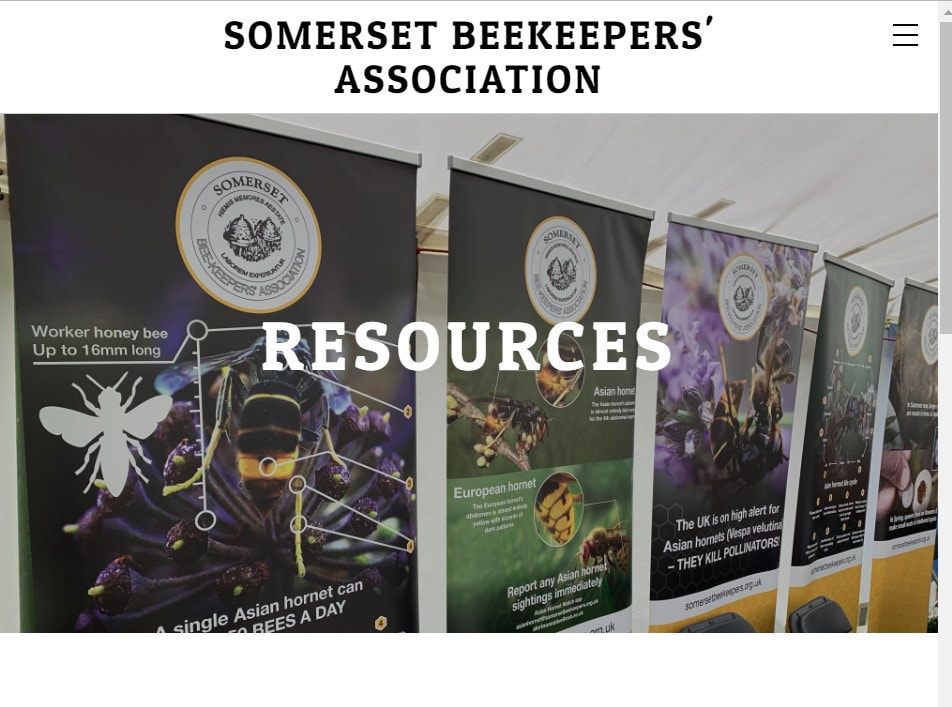
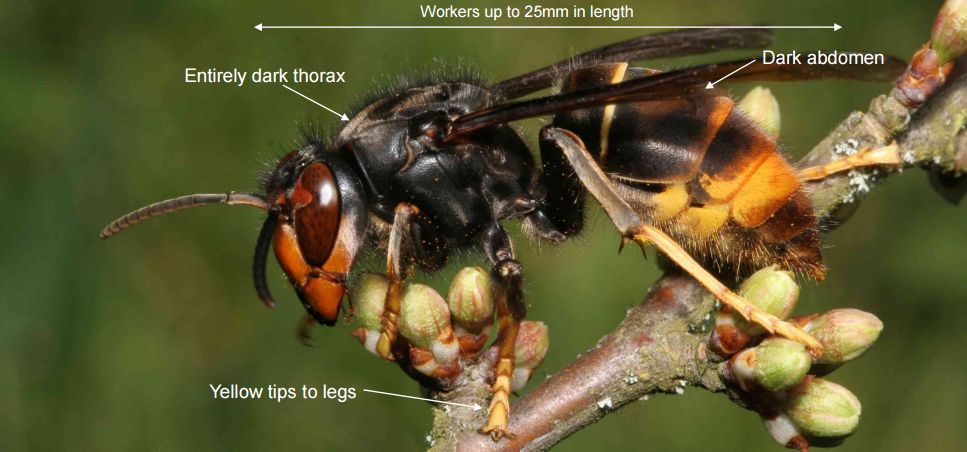
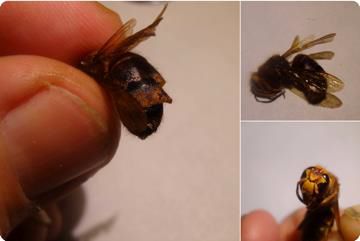
 RSS Feed
RSS Feed
